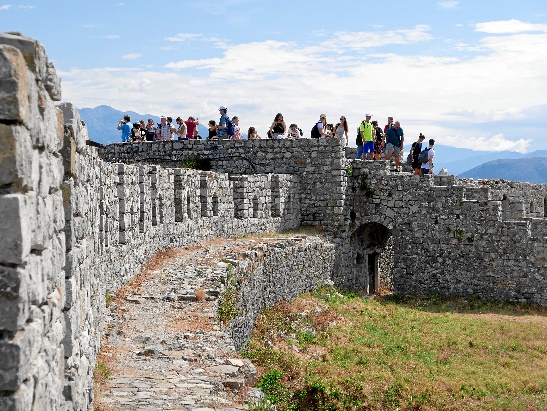 “Sunday 20 August, 2017, 5:00 a.m. From afar, I hear the call to prayer of the muezzin. The thermometer already reads 30°C. I am in a tiny log cabin in the small Village for Peace in Shkodër, in Albania. Built by the Catholic Church for the refugees during the second Balkan war at the end of 1999, it now hosts our camp, go4peace.” So begins the narrative journal of Meinolf Wacker, a young German priest, who for more than 20 years has been involved, along with other priests of the Focolare Movement, in the Balkans – a land marred by wars and divisions – in organizing “schools of peace” for hundreds of young people. His first thought in the morning is of the previous evening, just a few hours ago, and of the huge concert prepared by the youth on the square of the cathedral of Shkodër. At the conclusion of the concert, Mark, who comes from Ireland, gave voice to their appeal: “We are here from the North and the South, from the East and the West of Europe. Peace is a goal we must reach, and we must see in each person a brother or a sister. If we love each other, peace will be the outcome. It takes passion, patience, and tenacity. We want to become a generation full of passion for peace.”
“Sunday 20 August, 2017, 5:00 a.m. From afar, I hear the call to prayer of the muezzin. The thermometer already reads 30°C. I am in a tiny log cabin in the small Village for Peace in Shkodër, in Albania. Built by the Catholic Church for the refugees during the second Balkan war at the end of 1999, it now hosts our camp, go4peace.” So begins the narrative journal of Meinolf Wacker, a young German priest, who for more than 20 years has been involved, along with other priests of the Focolare Movement, in the Balkans – a land marred by wars and divisions – in organizing “schools of peace” for hundreds of young people. His first thought in the morning is of the previous evening, just a few hours ago, and of the huge concert prepared by the youth on the square of the cathedral of Shkodër. At the conclusion of the concert, Mark, who comes from Ireland, gave voice to their appeal: “We are here from the North and the South, from the East and the West of Europe. Peace is a goal we must reach, and we must see in each person a brother or a sister. If we love each other, peace will be the outcome. It takes passion, patience, and tenacity. We want to become a generation full of passion for peace.” 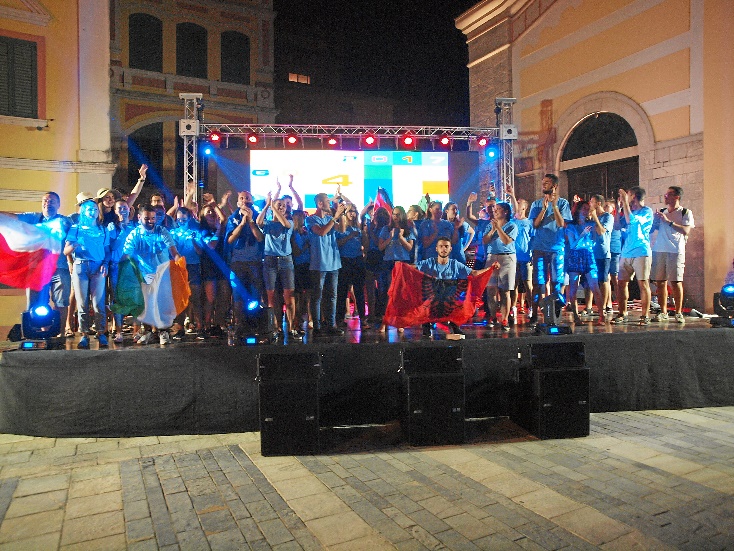 The members of the band that played that night come from Albania, Cameroon, Slovenia, Spain, and Germany, after no small difficulty. The Germans, for example, once they had arrived in Sarajevo, crossed the mountainous region of Montenegro in a rental van, almost a 40 hour drive. They had not even the time to catch their breath when they were divided into small groups to get to know one another. Every day, there was a motto to live by. “Don’t stop giving!” for example. But even looking at nature could inspire a new motto, like seeing a cow resting in the field, taking her time as she chewed her cud. In a hectic, frenzied world, one needs to stop every once in a while, and “ruminate” interiorly on whatever God wants to say to us.
The members of the band that played that night come from Albania, Cameroon, Slovenia, Spain, and Germany, after no small difficulty. The Germans, for example, once they had arrived in Sarajevo, crossed the mountainous region of Montenegro in a rental van, almost a 40 hour drive. They had not even the time to catch their breath when they were divided into small groups to get to know one another. Every day, there was a motto to live by. “Don’t stop giving!” for example. But even looking at nature could inspire a new motto, like seeing a cow resting in the field, taking her time as she chewed her cud. In a hectic, frenzied world, one needs to stop every once in a while, and “ruminate” interiorly on whatever God wants to say to us. 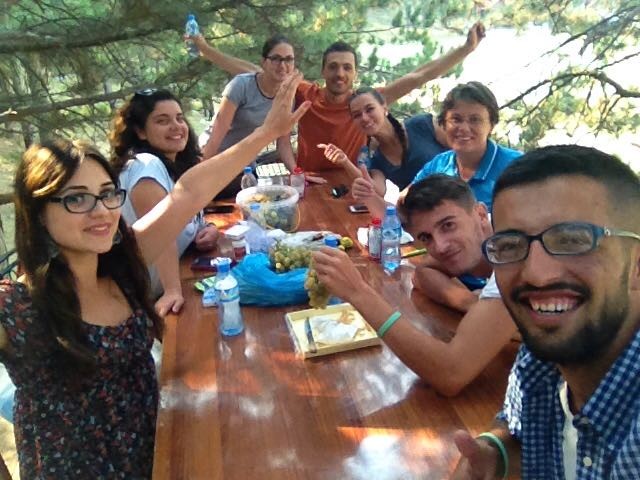 “At the beginning of the camp,” writes Meinolf, “we stopped on the famous Mes Bridge, in the town of Mes. Standing united, hand in hand, all the participants, Muslims, Protestants, Catholics, or of other worldviews, we entrusted ourselves to the mystery of God, in silence. During the week there were 31 workshops that gave the youth the chance to come into contact with the people of that town. Each day more than a hundred children awaited us in Fermentim, on the periphery of Shkodër, where a community of sisters works daily.” Here the youth make key chains and work on the painting and flooring of the nursery school and the house of a family. “Other stops on the tour included the Museum of St Stephen’s Cathedral, in Shkodër, where we remembered the 38 martyrs killed during the communist regime from 1945 to 1974, the Museum of Memory with the horrors committed in those years, and the visit to a mosque. In an interreligious workshop we talked about the relationships between religions in the Balkans. We also planted some trees, painted a few houses in the village, and met the children entrusted to the sisters of Mother Teresa. The day always ended with a festive dinner in the village. “Along with Christoph and Tobias from the agency, 18frames Film+Media Produktion from Hamburg, we prepared the campaign, ‘Yourope,’ in order to engage young Europeans in ‘showing their face’ to demonstrate a Europe without barriers. A videoclip made during the camp, with our faces on a black background, ends with the invitation to send us other brief videos with the same initial phrase: I show my face … Armela took a small mascot from my car – a moose – put it on her shoulders and continued: I show my face because I am from Albania, studying in Austria, sitting in a French car with a German driver and a young friend from Sweden. In a few days more than 50 thousand people had viewed the clip.” Two participants share: “When I heard, a year ago, that the camp would be held at Shkodër, I was skeptical. I come from Albania and I know the mentality of my country. Throughout the preparations, I helped as much as I could. The first two days went well. But when the workshops began, there was so much confusion. ‘Welcome to the chaos!’ I thought. But then, everything turned out differently from how I had imagined it. At the end of the closing concert, I had to explain the campaign, ‘Yourope.’ I could see true joy in the eyes of everyone in the audience! Love had been stronger than the obstacles!” “The evening masses were not empty rituals, but deep faith lived out, which overwhelmed me. The explanations on the meaning of suffering and on the encounter with Jesus in suffering helped me a lot, and I continued to ‘ruminate’ on these for a long time.” See video clip
“At the beginning of the camp,” writes Meinolf, “we stopped on the famous Mes Bridge, in the town of Mes. Standing united, hand in hand, all the participants, Muslims, Protestants, Catholics, or of other worldviews, we entrusted ourselves to the mystery of God, in silence. During the week there were 31 workshops that gave the youth the chance to come into contact with the people of that town. Each day more than a hundred children awaited us in Fermentim, on the periphery of Shkodër, where a community of sisters works daily.” Here the youth make key chains and work on the painting and flooring of the nursery school and the house of a family. “Other stops on the tour included the Museum of St Stephen’s Cathedral, in Shkodër, where we remembered the 38 martyrs killed during the communist regime from 1945 to 1974, the Museum of Memory with the horrors committed in those years, and the visit to a mosque. In an interreligious workshop we talked about the relationships between religions in the Balkans. We also planted some trees, painted a few houses in the village, and met the children entrusted to the sisters of Mother Teresa. The day always ended with a festive dinner in the village. “Along with Christoph and Tobias from the agency, 18frames Film+Media Produktion from Hamburg, we prepared the campaign, ‘Yourope,’ in order to engage young Europeans in ‘showing their face’ to demonstrate a Europe without barriers. A videoclip made during the camp, with our faces on a black background, ends with the invitation to send us other brief videos with the same initial phrase: I show my face … Armela took a small mascot from my car – a moose – put it on her shoulders and continued: I show my face because I am from Albania, studying in Austria, sitting in a French car with a German driver and a young friend from Sweden. In a few days more than 50 thousand people had viewed the clip.” Two participants share: “When I heard, a year ago, that the camp would be held at Shkodër, I was skeptical. I come from Albania and I know the mentality of my country. Throughout the preparations, I helped as much as I could. The first two days went well. But when the workshops began, there was so much confusion. ‘Welcome to the chaos!’ I thought. But then, everything turned out differently from how I had imagined it. At the end of the closing concert, I had to explain the campaign, ‘Yourope.’ I could see true joy in the eyes of everyone in the audience! Love had been stronger than the obstacles!” “The evening masses were not empty rituals, but deep faith lived out, which overwhelmed me. The explanations on the meaning of suffering and on the encounter with Jesus in suffering helped me a lot, and I continued to ‘ruminate’ on these for a long time.” See video clip
Observe God’s laws
Observe God’s laws

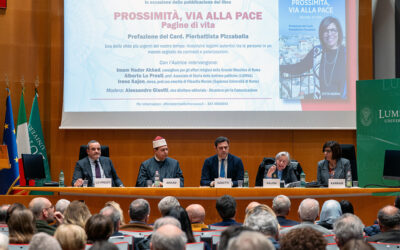
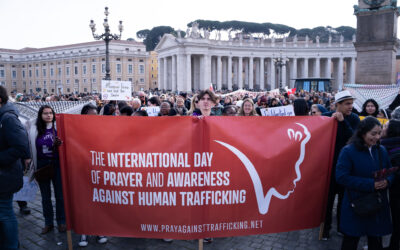

0 Comments